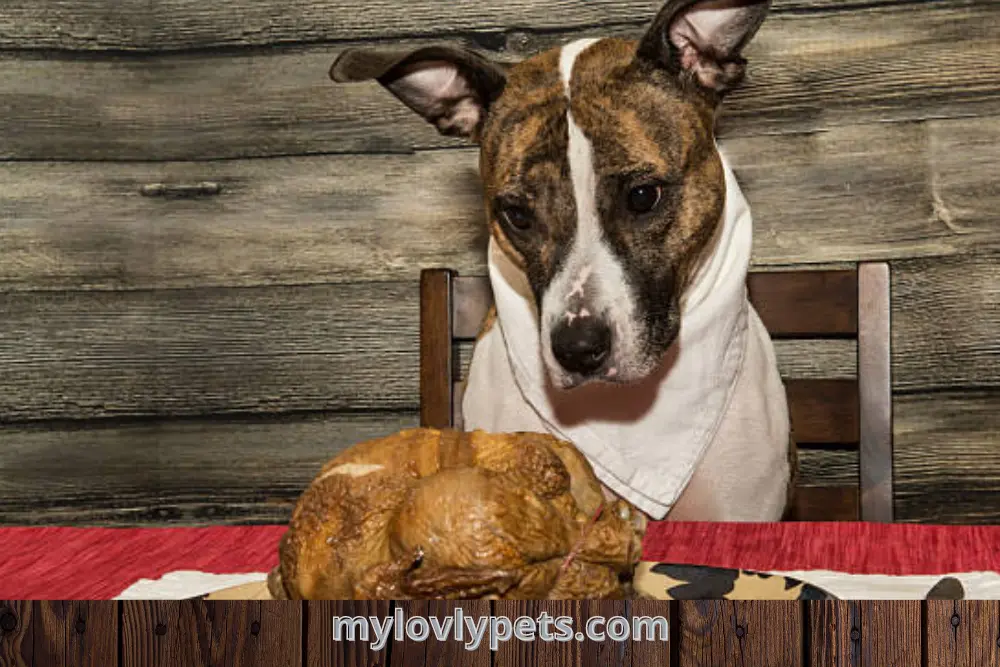
If Dog Is Allergic To Chicken Is Turkey Ok?
Our canine friends are more like humans than we realize, including dietary sensitivity. Beef, dairy, and chicken allergies are three of the most common allergens in canines. Dogs can be allergic to chicken, which is essential to know because many high-quality commercial dog foods contain chicken in some form.
Then it comes to mind If dog is allergic to chicken is turkey ok? Turkey is a lean, delicious meat that is ideal for a dog who is allergic to chicken.
It is used in many commercial dog foods and treats because it is a lean form of protein that is easy to digest. It’s also considered an excellent alternative meal for dogs that are allergic to chicken, as we’ll talk about below.
Food Allergies in Dogs?
If your dog suffers from food allergies, it’s because its immune system has developed a severe sensitivity to the proteins in certain foods. A dog’s skin problems or stomach upset may make you think he has allergies, but it’s only an intolerance or sensitivity in many situations.
Chicken Allergy Causes in Dogs
When a dog’s immune system gets too sensitive to chicken, it develops an allergy. The dog’s body starts to think that chicken is dangerous, and every time your dog eats it, an allergic reaction happens.
Once your dog is sensitive to chicken, the problem can get worse. As long as your dog keeps eating the food that bothers it, its immune system will constantly react, causing painful allergy symptoms.
Some dogs are more likely to have food allergies because of their genes, while others may develop them over time. Your dog can acquire an allergy to an item even if it has eaten the same food for years. Although the precise cause is unknown, we know that for sensitivity to develop, a dog must be exposed to the offending food more than once.
Can My Dog Eat Chicken?
Because of its low cost and high protein content, chicken is a prominent ingredient in dog food. It’s also tasty. It has the protein, vitamins, and minerals your best buddy needs to stay healthy.
Only a small fraction of dogs will show sensitivities to chicken, though. It’s essential to be mindful that chicken is a common ingredient in many commercially available dog foods, dog treats, and even rawhide chews. Find dog chews and treats that don’t include chicken if you suspect your dog has an allergy and have it confirmed by a veterinarian.
What Are the Symptoms of Chicken Allergy?
There are many indications that your dog may be allergic to or sensitive to chicken. Get your dog to the vet as soon as you notice any symptoms so you can ease his suffering.
Possible skin reaction signs include:
Redness on ears and paws
Itchiness and skin and paw biting
Scattered bald patches
Multiple skin infections
Repeated ear infections
Reactions in the digestive tract may include:
Gastric Diarrhea
Stomach distress and vomiting
If Dog is Allergic to Chicken is Turkey Ok
Yes, it is. Since the proteins in chicken and turkey are different, being allergic to one does not mean it can be allergic to the other.
Dogs do not often have allergies at birth, but rather acquire them over time. Since this protein has been identified as problematic, the immune system has begun to attack it as if it were a foreign invader.
The average turkey is about the same size as a large chicken. But the protein content of each is very different. Turkey meat is a lean, easy-to-digest protein that is great for dogs allergic to dog foods made with chicken or beef. Benefits from its high riboflavin and phosphorus content include:
Riboflavin helps your dog’s body break down amino acids and carbs.
Together with calcium, phosphorus keeps your dog’s bones and joints strong.
A dog’s diet needs both of these minerals to function correctly.
Is Tuna Fish Good For Dogs? Benefits Of Tuna For Dogs
Can I Give My Dog Duck Necks? A Detailed Guide
How to Prepare Turkey for Your Dog

While the turkey is okay for your dog to consume, the stuffing and other seasonings should be avoided at all costs. Let’s look at the reasons why eating turkey that has been prepared in a certain way for humans can be harmful to your dog:
Leave the turkey skin off: Some dogs may have stomach troubles if they eat turkey skin due to its high-fat content. The pancreas can become red and inflamed if it consumes too much fat, such as a large portion of turkey skin. This condition, called pancreatitis, is highly critical and requires emergency veterinary care.
Skin-added flavors and fats, like marinades and brines, can also harm your dog. Both onions and garlic are highly poisonous and have been linked to fatal cases of anemia. Sage, another spice we put on turkeys, is safe for dogs in modest amounts.
Avoid fatty dark turkey flesh: Dark meat from the leg and thigh, which tends to be higher in fat, could be bad for your dog if they are already overweight or has digestive issues. Try ground turkey instead to get the most out of the turkey.
No turkey bones: Even larger cooked turkey bones can splinter when bitten. This is dangerous because it can cause intestinal obstructions or, even worse, perforations in your dog’s mouth or throat. Turkey bones are safe for dogs to eat raw as part of a raw diet but should never be cooked.
Accidental ingestion of a bone is usually harmless for your dog; the damage comes from the subsequent gnawing and splintering.
Avoid uncooked turkey pieces: When feeding dogs, a raw turkey diet, the flesh must be processed in a specific way to prevent illness. Tossing the raw turkey from dinner preparations into the dog bowl is not a good idea since the meat may be contaminated with salmonella.
Turkey for human consumption is prepared, assuming it will be cooked. Any bacteria on the meat’s surface or within the meat itself will be eliminated. Raw dog food producers prepare meat for consumption.
Avoid the deli and canned turkey: There may be too much salt, additives, and preservatives in processed turkey products, including bacon, sausage, deli turkey, and hot dogs. Because dogs’ digestive systems differ from our own, feeding them processed meals can wreak havoc on their immune systems. While a single morsel of processed food might not disturb your dog’s system, feeding it daily might negatively affect its health.
Final Thought If Dog is Allergic to Chicken is
Turkey Ok
Whenever you’ve wondered, “If dog is allergic to chicken is turkey ok, ” the simple answer is yes. Turkey is safe for your dog to eat and provides a lean source of protein that is easy to digest. Served as a regular source of protein, this meat is an excellent substitute for chicken or beef when cooked healthily without spice or skin, and it may be the solution to your dog’s dietary sensitivities.
FAQs
When do allergies develop in dogs?
Most dogs get allergies between six months and three years old.
Since pups’ immune systems are still growing, symptoms before six months are not likely to be allergies. But allergies can happen in older dogs, so just because a dog is over three years old doesn’t mean it doesn’t have allergies.
What foods cause allergies in dogs?
Even though most people think that dogs are allergic to grains, most dogs are allergic to a type of protein in their food. Most of the time, the proteins in chicken, beef, lamb, soy, eggs, dairy, and wheat are to blame. There’s nothing fundamentally wrong with these components since they may all be good protein sources and other nutrients in dog diets.
Even though these are the most common ingredients, dogs can be allergic to anything in their food or toys. Therefore, the “best” dog food will differ from pet to pet, and there is no such thing as a completely hypoallergenic dog food.
If my dog is allergic to chicken, does that mean he’s also allergic to
turkey?
Depending on how sensitive a dog’s immune system is, this answer may differ for each dog. A good rule of thumb is to try a new protein in a food trial, such as switching from chicken to venison for a test. Your veterinarian is the best person to advise you on what food is right for your dog.
If my dog is allergic to chicken, what can I feed it?
A good choice for a food trial is generally a source of protein that is very different from chicken, like beef or rabbit or venison. But it’s important to carefully check the ingredients because many dog foods have chicken meat, innards, or broth, even if it’s not the main ingredient. If prepared in the same facility as chicken-based dog food, even non-chicken meals may be affected.
Many vets suggest using a prescription allergy food for all of these reasons. The protein in these foods comes from a new source, like rabbit or venison, or it is “hydrolyzed.”
To prevent cross-contamination, the facility will shut down and clean the prescription allergy dog food equipment. Prescription diets are an excellent initial step to getting the most accurate food allergy test results.
Is a dog’s food allergy sudden?
No matter how fast or slow they develop in the body, allergies can appear to start all of a sudden. This is because allergies only become apparent when symptoms bother a dog.
It’s best to take your dog to the vet if any signs of an allergy appear, no matter how fast or slow that may be.


